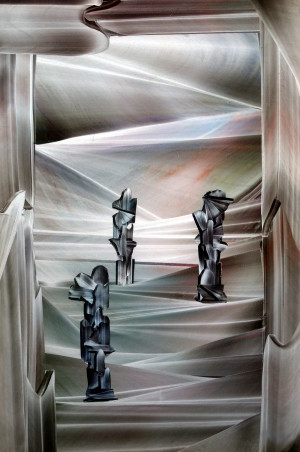Certificate of Authenticity
Hratch Israelian
#104
Details
Production year
2019
Object type
Painting
Dimensions
25 × 28 × 1 inches
Medium
Watercolor on Paper
Production Location
Los Angeles Ca. USA
Location
Los Angeles Ca. USA
Certificate of Authenticity
Our patented certificates are designed to evolve over time, unlike paper certificates. All changes to the certificate are registered on the blockchain, proving a clear and trusted timeline of the certificate’s evolution.
Verified issuer
Creator authorized
Physical link
Created by
Hratch Israelian, 1956
Signed by

Issued by
Hratch Israelian
Owned by
Private
History
•
EditedJun 3 2021 21:30:48 UTC
•
CreatedJun 3 2021 01:23:16 UTC
Notes
Notes from Creator
The biggest misconception about these paintings is that they are beautiful effects created by some technique. Such effects are more common with contemporary artists to make their work more engaging and attractive without implementing any structural change to the entire painting process. Here are five examples to differentiate them. 1: it’s a common practice for students to use charcoal in drawing classes. The charcoal, unlike pencil, leaves dark thick lines but some creative students can turn these lines into smooth surfaces by just rubbing thick lines with a cloth and spreading the charcoal evenly. This action creates an effect in drawing. 2 Another student might take some post-it notes, cut them into different shapes, place them on top of drawings to establish boundaries, and then do the rubbing. . This approach can create sharp silhouettes after the post-it notes are removed. Here the effect was elevated to a technique. This gave us smooth surfaces and also defined outlines. 3 Another student wants to create depth by applying one point perspective. Is the law of perspective just another technique? Of course not, it’s a science of space that has been used hundreds of years as a painting method. But even the method has its limitations. Perspective gives us an illusion of depth, but it does not have any relevance to color and design, light and dark, and other aspects of the art-making. It’s not hard to guess that the next step of the ladder will be a process that introduces entirely new solutions to all the aspects of the painting process. the creation of light and dark; form and space; colors and shades depth; the entire overlapping’s; reflections and shadows; 1ST 2nd 3rd 4th planes are transformed entirely. Effects and techniques are the results of impulsive creativity, while the methods and processes are structural changes of the entire operation. The last two break away from the tradition but remain in a comfortable reach for the traditionalist. In other words, the new structural and operational changes remain in the same medium. 5. If another student decides to use photography, the student moving into an entirely new medium.
What is Modern Art?” A question that puzzles many of us.
In the name of modern art, artists tried everything and it’s opposite; creating more questions than answers.
Can we find our answer in the digital world? Since digital sculpting unfolds a technical renaissance around us.
How about digital Painting?
In digital world higher quality picture means a larger digital file and a larger digital file means slow traffic. It’s obvious that speed, size, and quality cancel each other out, even in digital images.
What does all this have to do with Modern art?
Modern Art came out of Modernity, and Modernity came out of technological transformations, which stands on the balance of four pillars: production speed, quality, cost, and size.
Can we create the modern brush for modern painting? A brush that has the essence of Modernism? A painting process which produce maximum speed, size and quality, with minimal cost and labor? Something that cameras and computers have not yet achieved?
Yes, we can. You are looking at it.
Other works by Hratch Israelian










